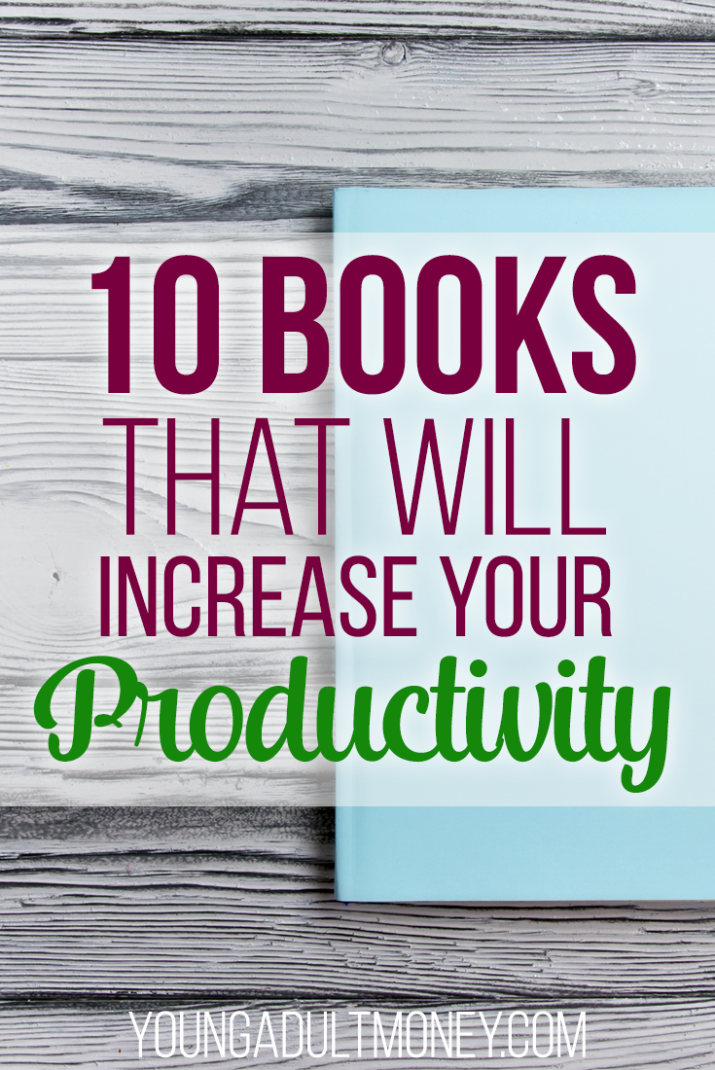 This post is part of our summer reading series! Read the first part on books to help you pay off debt here.
This post is part of our summer reading series! Read the first part on books to help you pay off debt here.
Do you wish you were more productive? Able to accomplish more in less time? Kill your to-do list in a single day?
I’m pretty sure most of us do. I don’t think I’ve ever heard of someone wanting to be lazier.
However, it can be a struggle to be productive after a long day of work, preparing dinner, and getting the kids to bed.
While we published tips on how to be productive while on the computer, it can be all too easy to get distracted by social media or browsing shopping sites.
If you want to stay focused enough to increase productivity, these books will show you the “how” behind it.
1) Mini Habits: Smaller Habits, Bigger Results
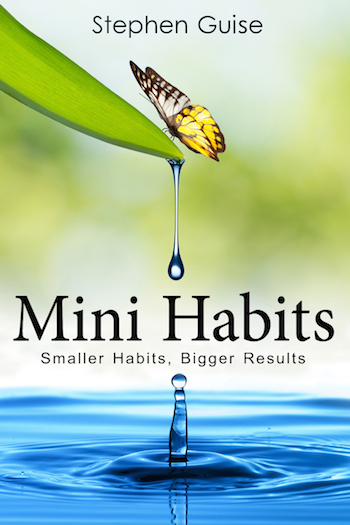 Mini Habits: Smaller Habits, Bigger Results by Stephen Guise is a great start for anyone completely new to the “world” of productivity. As you can tell from the title, the book is centered around the idea that we should break our goals down into manageable mini-steps.
Mini Habits: Smaller Habits, Bigger Results by Stephen Guise is a great start for anyone completely new to the “world” of productivity. As you can tell from the title, the book is centered around the idea that we should break our goals down into manageable mini-steps.
Say you want to work toward doing 100 squats a day, but you’ve been out of shape for years. You’re not going to jump right in and try to do that in one session, right? If you did, you’d likely lose all motivation anyway as you’d be disappointed with the results.
Instead, focus on doing one or two squats per day. That might seem ridiculous, but you give yourself a lot of room for error, and you’re more tempted to say, “Hey, this isn’t so bad! Let me do a few more.”
This strategy works much better than overwhelming yourself with a crazy goal right from the start. You’ll work your way up to those 100 squats with a much healthier mindset. Guise goes into the science of all of this in the book, too, which is pretty fascinating (and he has a great blog on the subject as well).
Recommended for…Anyone just starting to develop better habits for productivity. This book provides a great foundation and gives you an actionable strategy to work your way toward a better
2)Deep Work: Rules for Focused Success in a Distracted World
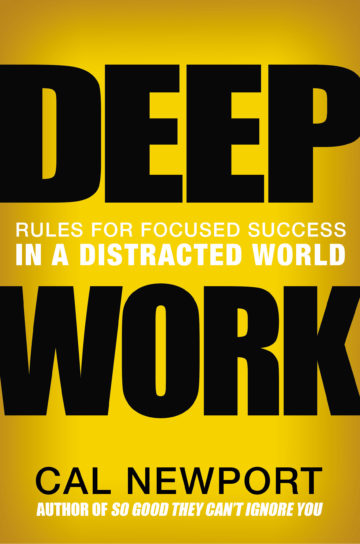 In Deep Work: Rules for Focused Success in a Distracted World Cal Newport teaches that intense focus is the best way to accomplish work, and intuitively, this makes sense.
In Deep Work: Rules for Focused Success in a Distracted World Cal Newport teaches that intense focus is the best way to accomplish work, and intuitively, this makes sense.
Think about it. How many of you are hopping from task to task as they come in? It might feel good to cross a bunch of things off your list, but how many of those things really matter?
I know I’m guilty of getting caught up in superfluous tasks like answering email, checking social media, and keeping tabs on analytics. However, none of these things require a tremendous amount of focus, and they all take away from the bigger picture.
If you have one project that needs all of your attention, and these little tasks are in constant competition for it, then you’ll have a harder time finishing that big task. That’s where the strategies in Deep Work can help.
Recommended for…Just about everyone that feels like they have too many little things going on that are overwhelming them to the point of not being able to focus on the big picture. This book will help you get your priorities straight and concentrate on what matters most.
3) Essentialism: The Disciplined Pursuit of Less
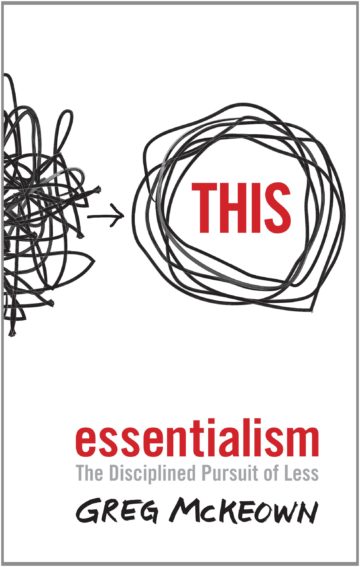 Essentialism: The Disciplined Pursuit of Less is a book I’ve heard lots of good things about. Greg McKeown follows a similar line of thinking as Newport, as you might be able to tell from the title. Essentialism is about clearing all the clutter away to make room for the big, important things (you know – what’s essential).
Essentialism: The Disciplined Pursuit of Less is a book I’ve heard lots of good things about. Greg McKeown follows a similar line of thinking as Newport, as you might be able to tell from the title. Essentialism is about clearing all the clutter away to make room for the big, important things (you know – what’s essential).
The description even says it’s not a time management strategy or productivity technique. Instead, it’s a systematic way to approach decision-making.
If you’re like me and have trouble saying “no,” whether it’s to extra work, an event, or something you’re just not feeling up to (but feel guilty about), Essentialism can help. It empowers you to take back control of your time so you’re not spread too thin.
By doing this, you can shift your focus back on what matters.
Recommended for…Anyone who knows they’re saying “yes” too often and doesn’t know how to stop. Also great for those in a position of management and those who are self-employed.
4) Eat That Frog!: 21 Great Ways to Stop Procrastinating and Get More Done in Less Time
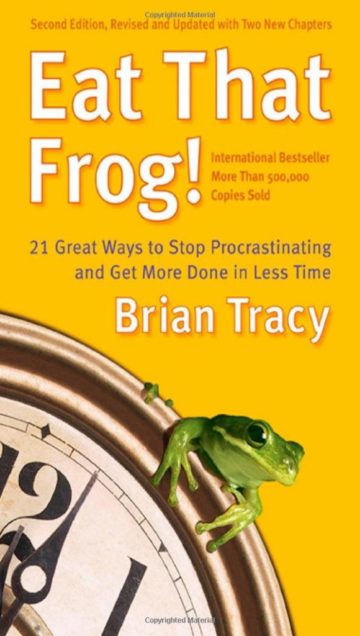 I know, the book title sounds like a blog post, but that shouldn’t detract from the content contained within. In Eat That Frog!: 21 Great Ways to Stop Procrastinating and Get More Done in Less Time, Brian Tracy does a good job of communicating an age-old technique that you may have heard of: tackle the biggest task first (or, Eat That Frog).
I know, the book title sounds like a blog post, but that shouldn’t detract from the content contained within. In Eat That Frog!: 21 Great Ways to Stop Procrastinating and Get More Done in Less Time, Brian Tracy does a good job of communicating an age-old technique that you may have heard of: tackle the biggest task first (or, Eat That Frog).
I read this book several years ago because I’m a total procrastinator and it’s a short, fun read with good, actionable tips.
The approach is in opposition to Mini Habits, but it’s focused more on tackling tasks than developing better personal habits. It also highlights the importance of getting that big task done – because it’s likely to have a bigger impact on your life.
Recommended for…People who find themselves with a never-ending to-do list who also happen to be Class A procrastinators. (A winning combination, if I do say so myself.)
5) The Power of Habit: Why We Do What We Do in Life and Business
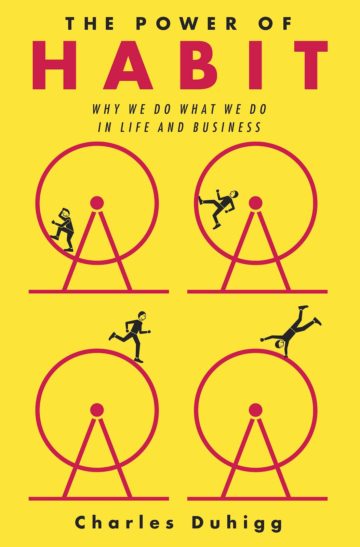 Are you noticing a trend yet? Productivity has a lot to do with your habits, and the first step to becoming more productive is to replace old, wasteful habits with good ones.
Are you noticing a trend yet? Productivity has a lot to do with your habits, and the first step to becoming more productive is to replace old, wasteful habits with good ones.
In The Power of Habit: Why We Do What We Do in Life and Business book, Charles Duhigg explains the science behind habits. How they’re formed, how we can replace the bad with the good, and why we should. He gives realistic examples from business, sports, and the military.
Mini Habits is a good complement to this book, as both focus on healthier habits and personal development, along with explaining the science behind it.
It’s both fascinating and scary, as Duhigg mentions how companies seek to discover our habits to improve targeted advertising. Then again, knowing how habits work can help you counter that (and spend less money)!
Recommended for…Anyone who wants to learn more background about habits and productivity. While you’ll certainly learn strategies in this book (it’s considered a “manual”), there’s a lot of interesting psychology behind it.
Honorable Mentions
There are so many productivity books out on the market because everyone can benefit from the literature. For that reason, I wanted to include an honorable mention section in case none of the above stood out to you.
6) The Miracle Morning: I listened to a podcast that had Hal Elrod on as a guest, and it was packed with information and motivation. Many people swear by The Miracle Morning, which is largely a morning routine that works. If you’re not a morning person, that could change, and for the better.
7) 15 Secrets Successful People Know About Time Management: What’s better than learning from people who walk the talk? Kevin Kruse interviewed some of the most successful business people, athletes, billionaires, and students to find out what time management skills they all had in common.
8) Smarter Better Faster: Another book by Charles Duhigg, this one is heavily based on research and studies. If you couldn’t get enough about the science of habits and productivity in The Power of Habit, this is a great follow-up.
9) Getting Things Done: The Art of Stress-Free Productivity: This book by David Allen is one of the most popular on Amazon. It offers a complete structure for organization and is a great read for those who have no idea where to start with productivity.
10) The Power of Less: Does anyone else love reading Leo Babauta’s blog, Zen Habits? Well then it’s only natural to read his book. It follows the same “Essentialism” principles of less is more, and trying to do it all is futile. Babauta has written quite a few books on the subject and practices what he preaches.
Limit Your Reading
I have to include a similar disclaimer here as I did with our last post. There’s only so many tips you can read before you need to move on, and the same applies here.
Yes, it’s great to read about strategies on how to be productive, but guess what? That in and of itself doesn’t make you productive. You might get a feeling of accomplishment from reading a book, but until you apply those strategies, you’re not putting your time to good use.
Being productive means getting out of the weeds, setting clear goals and objectives, and then doing what it takes to get there. Constantly looking for the next big breakthrough in productivity isn’t going to get you any closer to that!
__________________
If you had any goals this year that you’ve been slacking on, now is the time to pick up the pace and figure out what you can do to accomplish them. Pick a strategy from one of these books that sounds like it will work for you, and put it to the test!
Which of these ideas or systems interests you the most? Do you have any favorite productivity books or hacks? Share them!


Thanks for the great list! Why is that book called Eat That Frog?!
Haha, apparently it’s a take on a Mark Twain quote. It makes more sense with context. Taken from the description — Mark Twain once said that if the first thing you do each morning is to eat a live frog, you can go through the day with the satisfaction of knowing that that is probably the worse things that is going to happen to you all day long. Your “frog” is your biggest, most important task, the one you are most likely to procrastinate on if you don’t do something about it.
Thanks for another great book list! I haven’t read any of these, but some of them look great, especially the ones on essentialism and the power of habits. I know this is kind of weird, but one of the productivity hacks that helps me is not having a smartphone. Some day I’ll have to get one, but for now I think it helps me stay more focused.
I love that you don’t have one! I don’t think that’s weird at all. I know a few people who would rather not have one. Being connected all the time is not good for productivity at all, and you also have more pressure to be “checking in” on things, which leads to distractions.
I’ve read Eat That Frog! I was considering doing a review of it on my blog too. Good book with practical, actionable information.
Glad you also liked it! The world always needs more book reviews – go for it. =)
I’ve heard of a number of these, but never read any of them. Seeing as I can be a serious procrastinator, Eat That Frog sounds like the first one I should take a look at. :)
I don’t know that I’ll fully ever overcome being a procrastinator, but it does have a lot of great ideas, and it’s an easy read. Of course, you can always read to procrastinate on something else, so you know…vicious cycle! ;)
I have read (AND LOVED) all of these, except Deep Work. I’ll go check it out – it may just be my next read!
Erin,
This post has come at a good time for me. I REALLY need to get more done, as I have a TON of stuff piled up. Thanks for sharing.